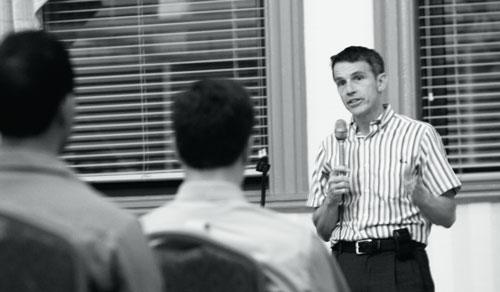On Sept. 22, the Saint Louis University Theology Club held the “Finding Christ in Prison: What We Learned About Learning in Prison” panel discussion.
The event featured speakers who had taught in SLU’s College In Prison program: Kenneth Parker, Grant Kaplan and Ron Modras. Each spoke about their experiences teaching inmates at the Bonne Terre Prison in Missouri.
Parker spoke about how he came to find the program, as he attests that the project is not his own. The idea came to him after he watched an episode of 60 Minutes, which featured the college-in-prison program at Bard College.
“I thought ‘Someone should do this at SLU, but I’m too busy,’” Parker said.
Parker went through with the idea anyway after a conversation with a tenant of his, who assured him that there was always time to do the right thing. He recalled that once he was in the prison classroom, he was struck by the intensity of the students and their “intellectual starvation.”
“I remember one student in particular who was afraid he was going to lose his spot when he was on probation. He said ‘This class is the only thing I have to live for right now.’”
With a grant from the Hearst Foundation and the support of various faculty members at SLU, Parker will be expanding the program to include more courses and a tract for the prison staff.
Modras, a professor in the theology department, taught in the program last fall. He spoke about how even though we are at different places in life we are all apart of the Jesuit family. He had two stories to share about members of the “family.”
The first was about Paul, a student inmate who grew so passionate about the Jesuit philosophy that he came to Modras and expressed his desire to do the Spiritual Exercises.
The Spiritual Exercises usually require a mentor of some kind to complete. Paul had no access to a mentor, so Modras gave him a book on how to do the Exercises alone.
“Paul said [the Spiritual Exercises] gave him strength to keep going. The Spiritual Exercises, which he made on his own, were giving him strength,” Modras said.
The second story was about another student named Jim. In one of the readings assigned, Jim expressed a serious problem with the use of the word “integrity.” He had been subjected to a screening, which required him to urinate for testing. He protested, stating he was unable to urinate on command. The officer conducting the test responded by saying that, “the integrity of the system says you need to urinate on command,” and punished him by putting him in solitary confinement for eight months. The same officer later reduced his sentence and took him out of confinement.
“When he told the story,” said Modras, “there was no anger, no resentment.”
To Modras, Jim was an example of forgiveness we rarely ever see.
Dr. Kaplan, another theology professor, spoke about his recent experience teaching in the Bonne Terre Prison.
“I had to go through an orientation process. The impression I got from the orientation was that the prisoners may seem nice, but they are really all out to manipulate you. And before you know it, you’ll be a drug mule or something.”
Kaplan admitted that he was a little scared when he first walked into the classroom, but he soon came to realize that the inmates were normal people and he was merely adhering to an image he had built about them.
One of the most important things he realized about the program was the sense of belonging and kinship that was built in the classroom.
“It’s not so much they taught me and I learned a lot, but the sense of belonging was what mattered. At the end of the class, I felt some sadness. And I really miss those guys,” Kaplan said.
The panel was followed by a short question and answer session, much of which addressed the future plans for the program.
The night ended with an opportunity for the students in attendance to meet with leaders of various service organizations to learn how they could get involved with similar programs.










